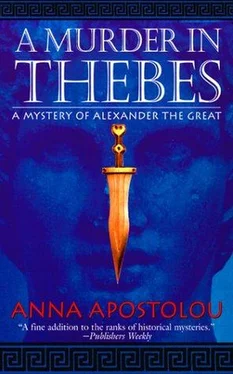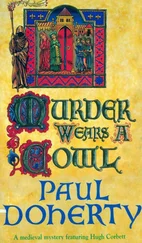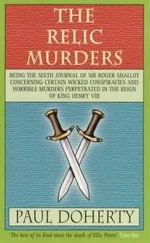Paul Doherty - A Murder in Thebes
Здесь есть возможность читать онлайн «Paul Doherty - A Murder in Thebes» весь текст электронной книги совершенно бесплатно (целиком полную версию без сокращений). В некоторых случаях можно слушать аудио, скачать через торрент в формате fb2 и присутствует краткое содержание. Год выпуска: 2013, ISBN: 2013, Издательство: Headline, Жанр: Исторический детектив, на английском языке. Описание произведения, (предисловие) а так же отзывы посетителей доступны на портале библиотеки ЛибКат.
- Название:A Murder in Thebes
- Автор:
- Издательство:Headline
- Жанр:
- Год:2013
- ISBN:9780755395736
- Рейтинг книги:4 / 5. Голосов: 1
-
Избранное:Добавить в избранное
- Отзывы:
-
Ваша оценка:
- 80
- 1
- 2
- 3
- 4
- 5
A Murder in Thebes: краткое содержание, описание и аннотация
Предлагаем к чтению аннотацию, описание, краткое содержание или предисловие (зависит от того, что написал сам автор книги «A Murder in Thebes»). Если вы не нашли необходимую информацию о книге — напишите в комментариях, мы постараемся отыскать её.
A Murder in Thebes — читать онлайн бесплатно полную книгу (весь текст) целиком
Ниже представлен текст книги, разбитый по страницам. Система сохранения места последней прочитанной страницы, позволяет с удобством читать онлайн бесплатно книгу «A Murder in Thebes», без необходимости каждый раз заново искать на чём Вы остановились. Поставьте закладку, и сможете в любой момент перейти на страницу, на которой закончили чтение.
Интервал:
Закладка:
They left the olive grove and took the white chalky path. Miriam looked around; the two soldiers still followed them. They turned a corner. Miriam stopped and gasped. The temple or shrine was small, of white stone; the trees around it heightened the atmosphere of serenity and coolness, it was as if Thebes still lived. Four soldiers lounged on the steps, an officer and three guardsmen. They scrambled to their feet as Alexander approached, desperately strapping on war belts, looking for shields and lances.
“Oh, for the love of Mother,” Alexander bawled, “what do you think I am, a Theban war party?”
The captain threw his belt away and came down the steps. He genuflected and kissed Alexander’s ring.
“Everything is in order here?”
“Yes, my lord,” the soldier replied, getting up. He glanced at Miriam and Simeon then back along the path to where the two soldiers stood.
“They are inside, my lord.”
“Who are?”
“The priestesses, sir. They have been here most of the time.”
“They haven’t been hurt?”
“Of course not, my lord. Two of my lads are in the vestibule.”
“And the keys?” Alexander asked.
“The old bi-. . the high priestess refused to hand them over.”
“Ah,” Alexander sighed; he rubbed his eyes. “I’ve got a feeling Jocasta and Mother would get on very well.”
They walked up the steps through the half-opened doors. Alexander paused to admire the club-bearing statue of Oedipus and the graceful form of Apollo the hunter. The soldiers inside were busy playing dice; they, too scrambled to their feet.
“Are the doors locked?” Alexander asked.
Miriam stared at the huge bronze-plated doors.
“I think the old woman has barred it behind her,” the soldier replied. “She said animals were not allowed in the shrine.”
Alexander walked up, drew his sword, and hammered. There was a faint sound of footsteps, of a bar being raised. The door was opened by a pale-faced and frightened young priestess dressed in white.
“You are not allowed in here.” She stumbled on the words.
“I am Alexander of Macedon, and I go where I wish!”
“Then enter, Alexander of Macedon!” a voice called out.
The young priestess moved aside. Miriam followed the king into the shrine.
She was aware of marble walls and floor, a white stuccoed ceiling. No ornaments, just niches in the walls where oil lamps glowed in pure alabaster jars. A wall recess to the side and, at the far end, glowing in the light of the sun whose rays shot like spears through the narrow windows, a long white pillar, an Iron Crown on top. Only then did she become aware of the two pits: The one around the pillar was simply a dip in the floor but she saw the glowing charcoal, the spikes at the far end. The women, who stood in line near a black iron bar that ran along the rim of the charcoal pit, were dressed from head to toe in white linen. Miriam glimpsed leather sandals, rings on fingers, a gold armlet. One of the women came forward, pulling back her cowl. Her wig was oil-drenched, her face old and raddled and coated in thick white paint, her eyes ringed with black kohl. Despite her age the woman carried herself with a certain majesty, her old eyes scrutinizing Alexander. She stopped and bowed.
“My lord King, I am Jocasta, chief priestess of the shrine.” She gestured at the other four. “This is Antigone, Merope, Ismene, and Teiresias.”
“All names,” Alexander said, “from the plays of Sophocles.”
The high priestess nodded. “Who we really are is no matter. We serve a god and guard his shrine in what was ‘Thebes, the City of Light.’”
“‘And what am I?’” Alexander replied, “‘the shedder of blood? The doer of deeds unnamed?’”
Miriam recognized the quotation from Oedipus Rex .
“‘Who is this man?’” Jocasta answered, also quoting from the play, “‘the son of Zeus, who needs to destroy?’ Welcome to our temple, Alexander, son of Philip.”
Miriam caught the sarcasm in her voice: Jocasta had pointedly described Alexander as she would any other man, as the son of a human father. Alexander brushed back his hair. “‘Greatest of men,’” he quoted, staring at the Crown, “‘He delved the deepest mysteries! Was admired by his fellow men in his great prosperity. Behold, what a full tide of misfortune swept over that head.’”
“‘And none can be called happy,’” Jocasta finished the quotation, “‘Until that day when he carried his happiness down to the grave in peace.’”
Alexander seemed not to be listening. He knelt on one of the quilted cushions in front of the iron bar, eyes fixed on Oedipus’s Crown. His hands came up, fingers curling, as if he wanted to stretch out and take it immediately. Jocasta came up behind him. The other priestesses, more nervous, clustered about her.
“Behold,” she said in a singsong voice. “Behold, Alexander, king of Macedon: the Crown of Oedipus, king of Thebes, beloved of the gods!”
“Slayer of his father!” Alexander finished. “Lover of his mother!”
“None can wear that Crown except the pure and those touched by a god.”
“I am king,” Alexander retorted. “I am conqueror and victor of Thebes. By divine decree that Crown is mine!”
“Then take it Alexander.” Jocasta’s voice was softly mocking. “What are you going to do? Empty the pit of fire? Crush the serpents under your boot? Unlock the clasps and take the Crown? And who can stop you? An old priestess and her acolytes? How all of Greece will laugh,” she taunted, “at the lion of Macedon.”
Alexander got to his feet, his face flushed. “It cannot stay here.”
“Look, look, Alexander.” Jocasta seized his elbow. “There is the Crown; it rests on top of the pillar. Look at the iron clasps. They can be loosened, the Crown lifted up and brought to your head.”
“How?” Alexander demanded.
Miriam closed her eyes. Alexander’s petulance had come to the fore. The old priestess had cleverly trapped him, like an elderly aunt reproving a recalcitrant nephew. All Alexander had to do was stamp his foot and shout, “I want! I want!” and the picture would be complete. Miriam stared at the pit of fire. It must be at least three to four feet deep and about two yards across. The spikes were ugly and gleaming, and in the dark pit beyond, what horrors existed! She had seen snake pits in the chambers of Olympias, the serpents writhing and coiling so that it seemed as if the whole floor were moving! All to protect that Iron Crown, the ruby in its center glowing like a small ball of fire. It was kept in place by two clasps at the front, like those on a chest, but how could they be pulled down without crossing the pits? Did the priestess have some kind of bridge that could lowered and extended across? And what would it rest against? The fire would burn any wooden structure, and the snakes would strike; even a man wearing thick military boots would be in great danger. So, if it was to be removed, it would have to be by subtlety and cunning rather than brute force. Miriam grasped Alexander’s arm, pinching the skin. The king moved away, walking the edge of the pit, his eyes fixed on the Crown.
“How do you remove it?” he asked.
“That is a mystery, my lord king. If the gods and the shade of Oedipus believe it is yours, the way will be shown to you,” responded the high priestess.
Alexander’s fingers drummed on his sword hilt. He smiled bleakly at her, and Miriam realized that this cunning old priestess had cleverly trapped him. Alexander might be conqueror of Thebes but now all of Greece would learn whether the Crown of Oedipus was still to be withheld from him.
CHAPTER 4
“There is another matter.” Alexander walked determinedly toward Jocasta in an attempt to reassert himself.
Читать дальшеИнтервал:
Закладка:
Похожие книги на «A Murder in Thebes»
Представляем Вашему вниманию похожие книги на «A Murder in Thebes» списком для выбора. Мы отобрали схожую по названию и смыслу литературу в надежде предоставить читателям больше вариантов отыскать новые, интересные, ещё непрочитанные произведения.
Обсуждение, отзывы о книге «A Murder in Thebes» и просто собственные мнения читателей. Оставьте ваши комментарии, напишите, что Вы думаете о произведении, его смысле или главных героях. Укажите что конкретно понравилось, а что нет, и почему Вы так считаете.












